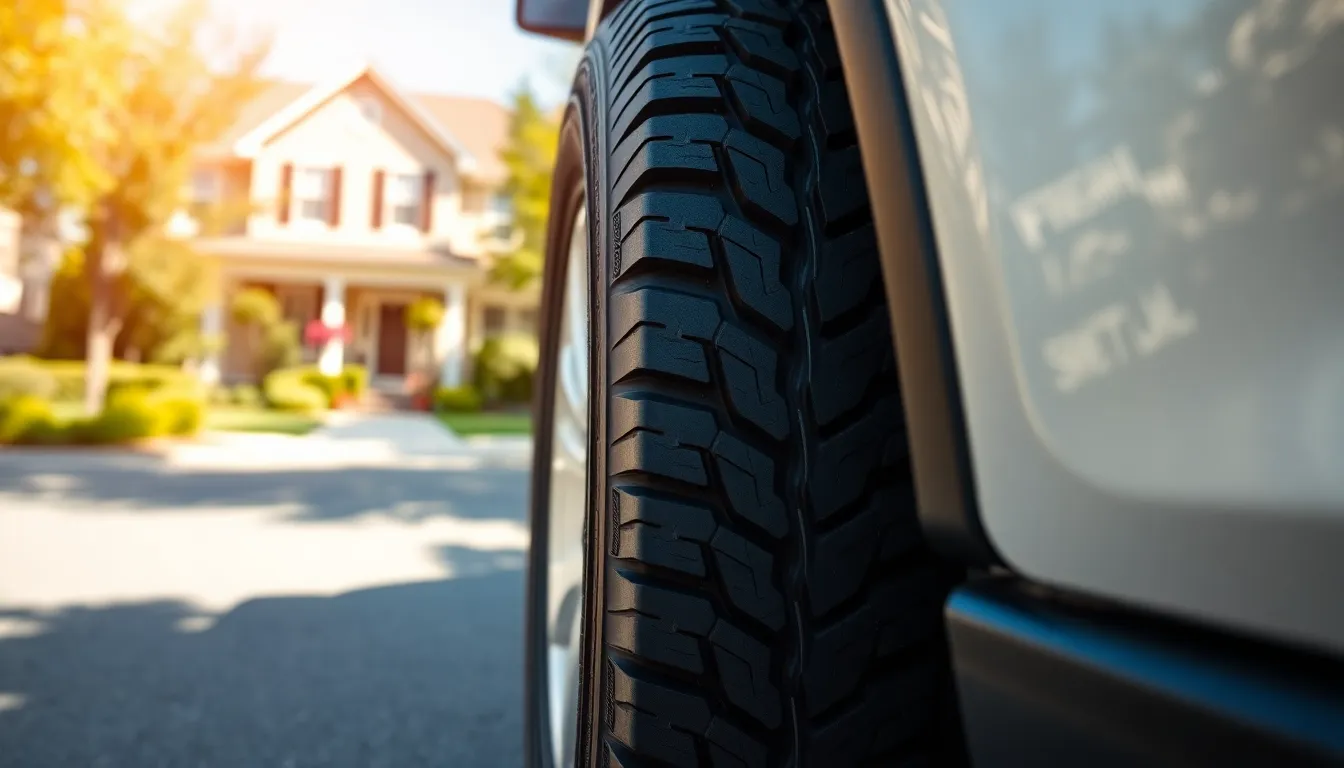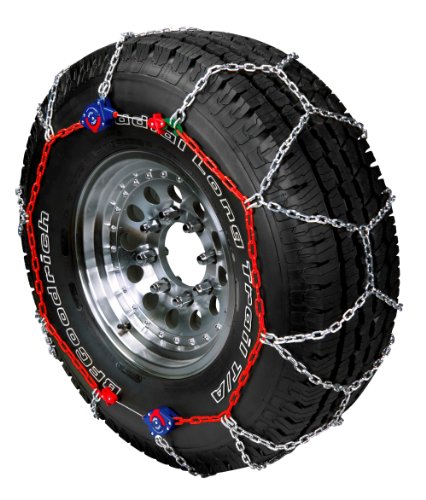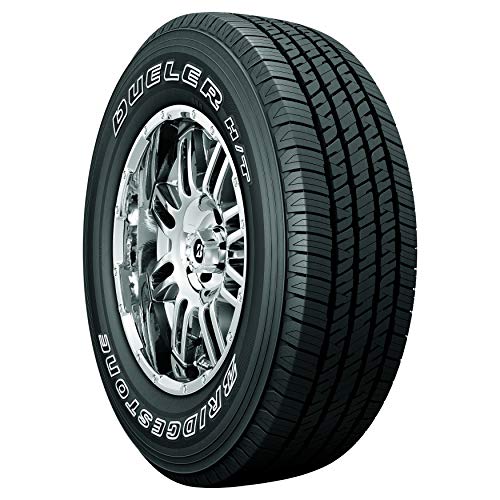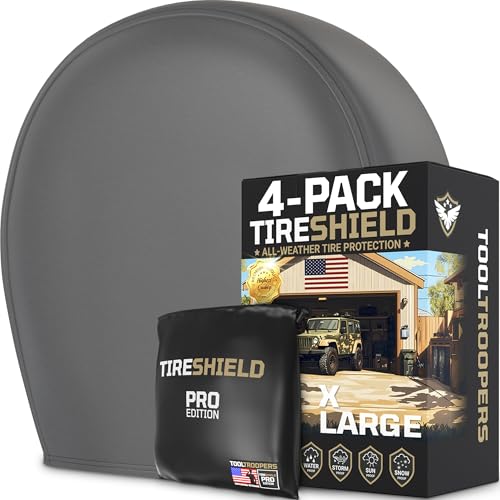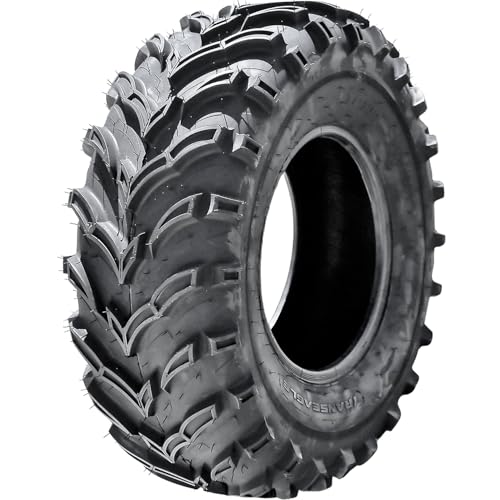When we’re shopping for new tires we want to know we’re making the right choice for our vehicle and our wallet. Firestone has been around for over a century but that doesn’t automatically make them the best option for your needs. With so many tire brands competing for our attention it’s crucial to separate marketing hype from real-industry performance.
We’ve analyzed thousands of customer reviews examined tire test data and compared Firestone’s offerings against top competitors to give you the complete picture. From their budget-friendly options to premium performance tires we’ll break down exactly what you can expect from this iconic American brand.
Whether you’re driving a daily commuter car hauling heavy loads in a truck or pushing your sports car to its limits we’ll help you determine if Firestone tires deliver the reliability safety and value you deserve for your exact driving situation.
Firestone Brand Overview and History
Firestone Tire & Rubber Company operates as one of America’s oldest tire manufacturers, established by Harvey Samuel Firestone in 1900 in Akron, Ohio. The company began producing solid rubber tires for carriages and bicycles before transitioning to pneumatic automobile tires as the automotive industry expanded.
Harvey Firestone’s partnership with Henry Ford in the early 1900s positioned the brand as a primary tire supplier for Ford Motor Company vehicles. This relationship helped establish Firestone’s reputation in the automotive sector and provided the foundation for decades of growth in tire manufacturing.
Bridgestone Corporation acquired Firestone in 1988, creating Bridgestone Firestone North American Tire. The acquisition combined Japanese engineering expertise with American manufacturing heritage, resulting in enhanced tire technology and expanded production capabilities across North America.
Today’s Firestone operates manufacturing facilities in 8 states and employs approximately 55,000 people across the Americas. The brand produces tires for passenger cars, light trucks, commercial vehicles, and specialty applications including agricultural and off-road equipment.
Firestone’s current tire lineup includes multiple product categories designed for different driving conditions and budgets. The Destination series targets SUV and truck owners, while the Champion series focuses on everyday passenger car applications. Complete Auto Care locations number over 1,700 across the United States, providing installation services and tire maintenance.
The brand’s 124-year history demonstrates consistent adaptation to changing automotive technologies and consumer demands. Firestone’s evolution from carriage tires to modern performance compounds reflects the company’s commitment to meeting diverse transportation requirements while maintaining its position in the competitive tire market.
Performance Testing and Quality Standards

Firestone’s commitment to quality extends beyond manufacturing into comprehensive testing protocols that validate tire performance. Laboratory evaluations ensure each tire exceeds minimum legal requirements through rigorous assessment procedures.
Tread Life and Durability
Durable materials form the foundation of Firestone’s construction approach, creating tires that deliver consistent performance over extended periods. Even tread wear patterns result from solid engineering that maximizes tire lifespan through strategic compound placement. Regular maintenance practices like tire rotations and proper inflation significantly impact durability outcomes, extending the usable life of each tire. Construction techniques focus on distributing stress evenly across the tire surface, preventing premature wear in high-contact areas.
Wet and Dry Traction Performance
Adaptive rubber compounds enable Firestone tires to maintain grip across varying road conditions and temperatures. Unique tread patterns channel water away from the contact patch while maximizing surface area contact on dry pavement. Superior traction capabilities reduce slip and skid risks, particularly during challenging weather conditions like rain or snow. Enhanced safety features result from specialized groove designs that optimize performance without compromising handling characteristics.
Noise Levels and Ride Comfort
Shock-absorbing elements integrated into Firestone’s tire design mitigate road surface irregularities that typically create uncomfortable driving experiences. Reduced road noise levels stem from precise tread pattern engineering that minimizes air turbulence and surface contact vibrations. Smooth ride characteristics improve vehicle handling while reducing driver fatigue during extended travel periods. Comfort enhancements result from balanced construction that maintains performance without sacrificing passenger experience quality.
Popular Firestone Tire Models Review
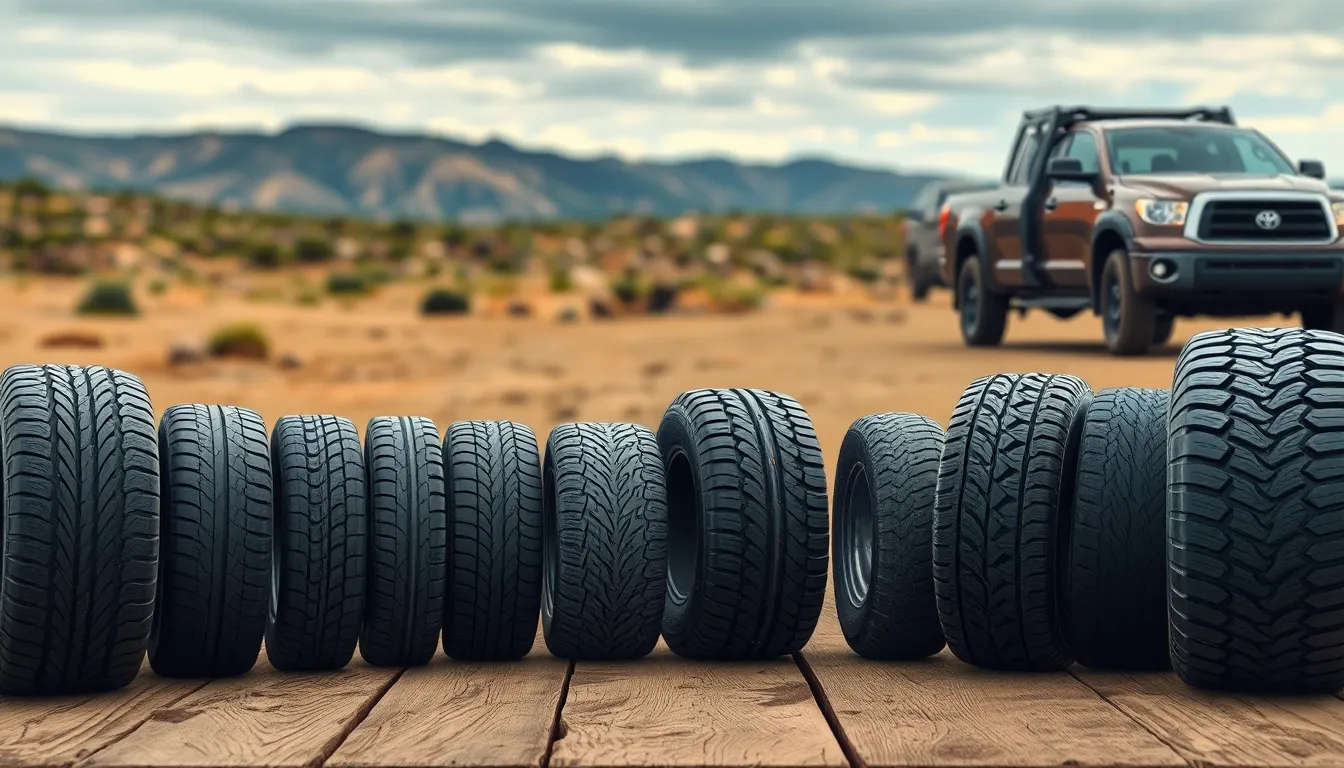
Firestone’s tire lineup spans three distinct categories that address different driving requirements and vehicle types. We’ve analyzed customer feedback and performance data to provide detailed insights into each series.
Destination Series for SUVs and Trucks
Destination tires deliver reliable performance for SUV and truck owners seeking versatility across various terrains. The Destination LE 2 stands out with its smooth road feel and excellent rain performance while demonstrating effective puncture resistance according to user reports. Drivers consistently praise this model for maintaining comfort during daily commuting and weekend adventures.
The Destination AT2 targets light off-road enthusiasts who require highway capability without compromising traction on unpaved surfaces. Recent reviews highlight this tire’s balanced approach to both on-road comfort and moderate off-road capability. Truck owners appreciate the AT2’s durability during mixed driving conditions that include gravel roads and highway cruising.
Champion Series for Everyday Driving
Champion tires focus on value-conscious drivers who prioritize longevity and fuel efficiency for daily commuting. The Champion Fuel Fighter receives recognition for its extended tread life and overall value proposition in the passenger car segment. But, customer reviews reveal mixed experiences about noise levels and uniform wear patterns after reaching 20,000 miles of use.
Some drivers report increased road noise as these tires age, particularly when compared to their initial quiet performance. Wear patterns occasionally become uneven even though proper maintenance, which affects the tire’s ability to deliver consistent performance throughout its expected lifespan.
Firehawk Series for Performance Vehicles
Firehawk tires cater to enthusiast drivers who demand superior handling and traction during spirited driving sessions. The Firehawk Indy 500 demonstrates strong dry traction capabilities and maintains stability during aggressive cornering maneuvers. Performance car owners consistently note this tire’s responsive steering feel and predictable behavior at higher speeds.
Wet traction performance exceeds expectations even though the tire’s performance-oriented tread design, making it suitable for year-round driving in most climates. The Indy 500 balances sporty characteristics with practical daily driving requirements, though it prioritizes performance over maximum tread life compared to touring tire alternatives.
Firestone vs Major Competitors
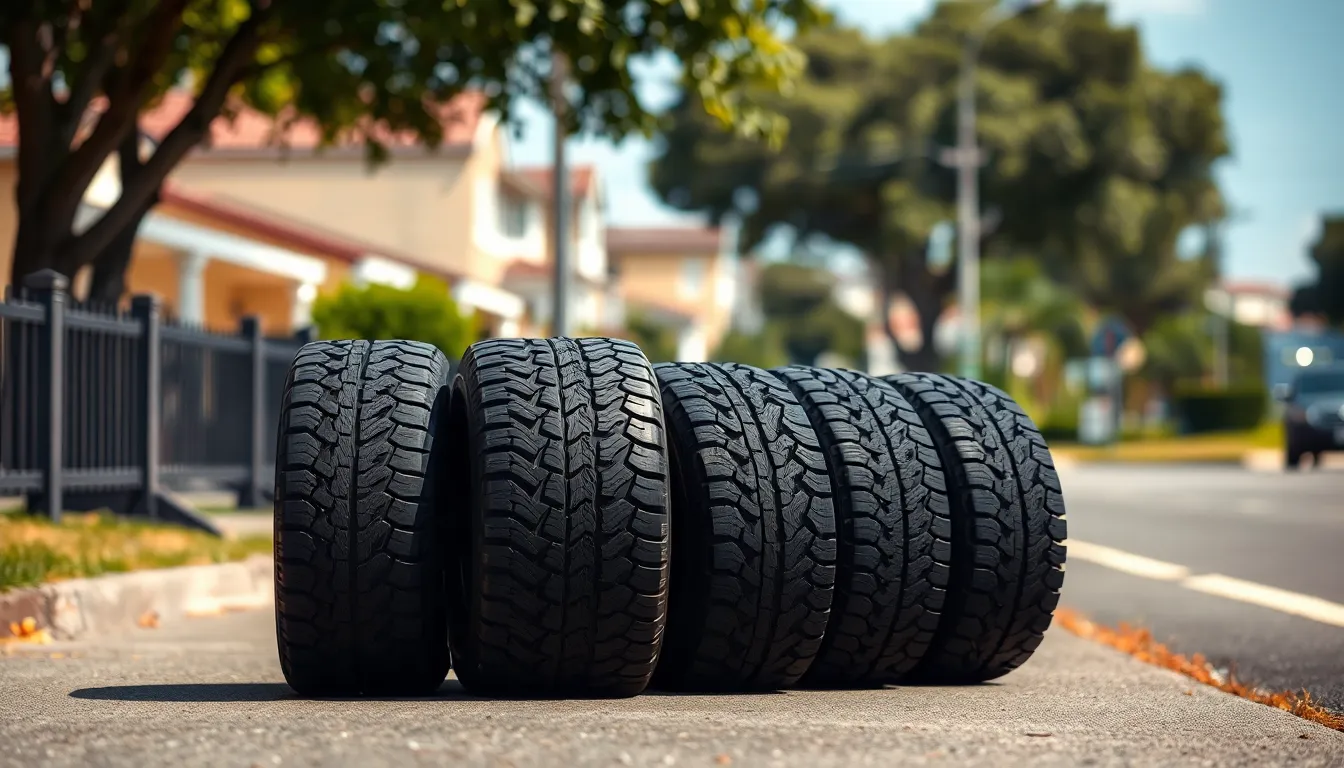
Firestone competes directly with industry leaders including Michelin, Goodyear, Bridgestone, and Continental in today’s tire market. Our analysis reveals distinct positioning differences between Firestone and premium competitors across pricing and performance categories.
Price Comparison Analysis
Firestone tires consistently offer more affordable options than premium brands like Michelin and Continental. Budget-conscious consumers find important savings when choosing comparable all-season or performance models from Firestone’s lineup. The price advantage makes Firestone particularly attractive for drivers seeking reliable performance without premium pricing.
Premium competitors typically command higher prices due to advanced engineering and extended warranties. Michelin and Continental models often cost 20-30% more than equivalent Firestone options. But, warranty coverage and expected tread life vary considerably between Firestone models and their premium counterparts.
Performance Metrics Comparison
Consumer Reports evaluates tires across six critical performance areas: braking, comfort, handling, hydroplaning resistance, noise, and tread life. Firestone earned an overall score of 4.0 out of 5.0 in recent tire studies, demonstrating solid performance across multiple categories.
| Metric | Firestone (Average) | Premium Competitors |
|---|---|---|
| Braking | Good | Excellent to Outstanding |
| Handling | Good | Excellent |
| Hydroplaning Resistance | Good | Excellent |
| Noise | Good | Very Good to Excellent |
| Tread Life | Varies by model | Excellent in most models |
Braking performance represents Firestone’s strongest competitive area, with models like the Firehawk Indy 500 delivering reliable stopping power. Handling characteristics across Firestone’s range provide confident control for everyday driving situations. Hydroplaning resistance in wet conditions performs adequately, though premium brands often excel in extreme weather scenarios.
Noise levels remain well-controlled in most Firestone models, contributing to comfortable cabin environments. Tread life varies significantly across Firestone’s product line, with some models like the Champion Fuel Fighter delivering impressive longevity while others show inconsistent wear patterns at higher mileages.
Customer Reviews and Real-World Experiences
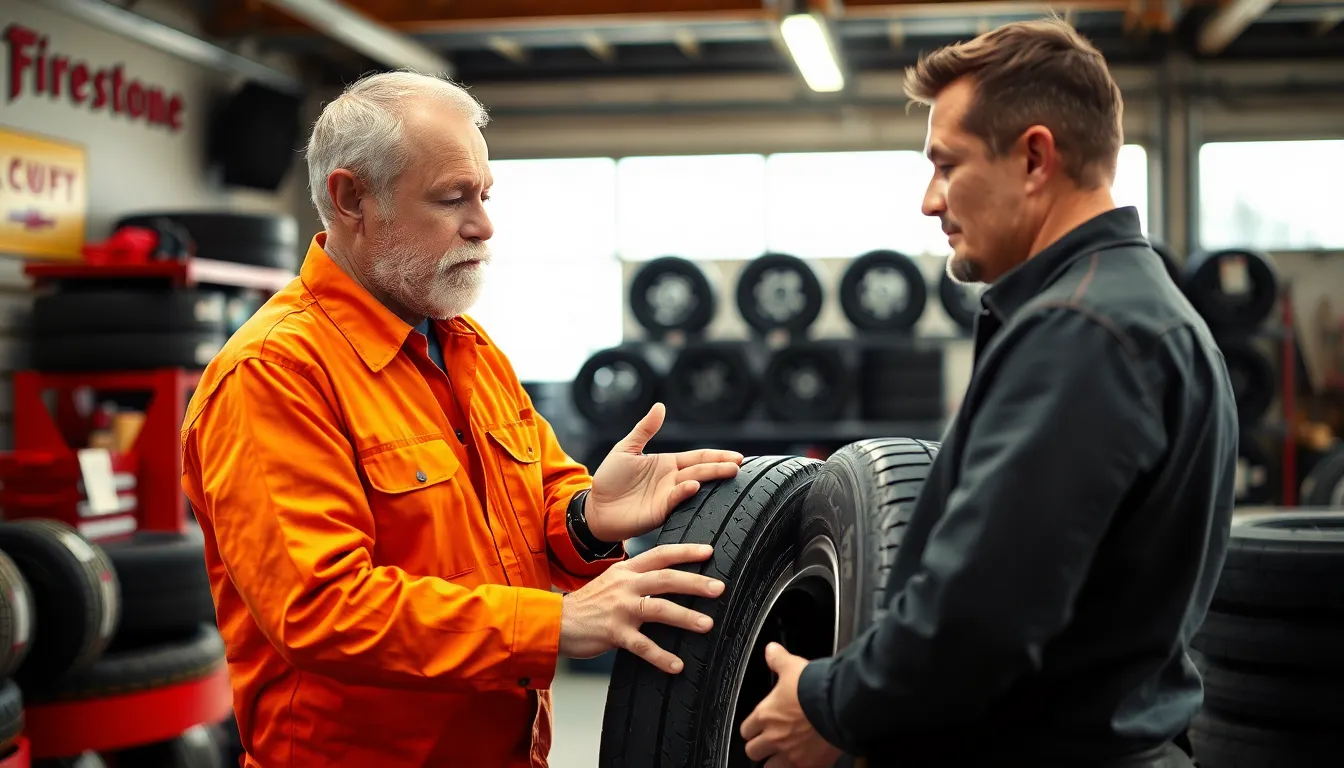
Firestone tires generate diverse feedback from drivers across different platforms and experience levels. Customer satisfaction varies significantly based on tire model selection and individual driving conditions.
Professional Mechanic Opinions
Automotive technicians frequently recommend Firestone tires for customers seeking reliable performance without premium pricing. Professional mechanics assess tire durability during routine inspections and often note Firestone’s consistent build quality across their product lines. Tire shops report steady demand for Firestone models like the FR740 due to their balanced performance characteristics. Service professionals appreciate Firestone’s even tread wear patterns which extend replacement intervals for customers. Mechanics specializing in fleet maintenance often select Firestone tires for commercial applications where cost effectiveness matters most.
Long-Term Owner Feedback
Vehicle owners report mixed experiences with Firestone tires over extended mileage periods. The Firestone FR740 receives positive feedback from SimpleTire customers who praise its smooth ride quality and impressive treadwear performance[5]. Drivers experience consistent handling across different weather conditions with many Firestone models. Consumer Affairs reviews reveal some negative experiences including vehicle problems and customer service issues[2]. Tire Rack features over 7,592 reviews for various Firestone models which demonstrates extensive real industry testing[3]. Long term users particularly value Firestone’s predictable performance in rain and dry conditions. Some owners experience uneven wear patterns or handling issues depending on exact tire models and maintenance practices. Fleet operators often choose Firestone for replacement tires due to reliable mileage performance and competitive warranty coverage.
Value for Money Assessment
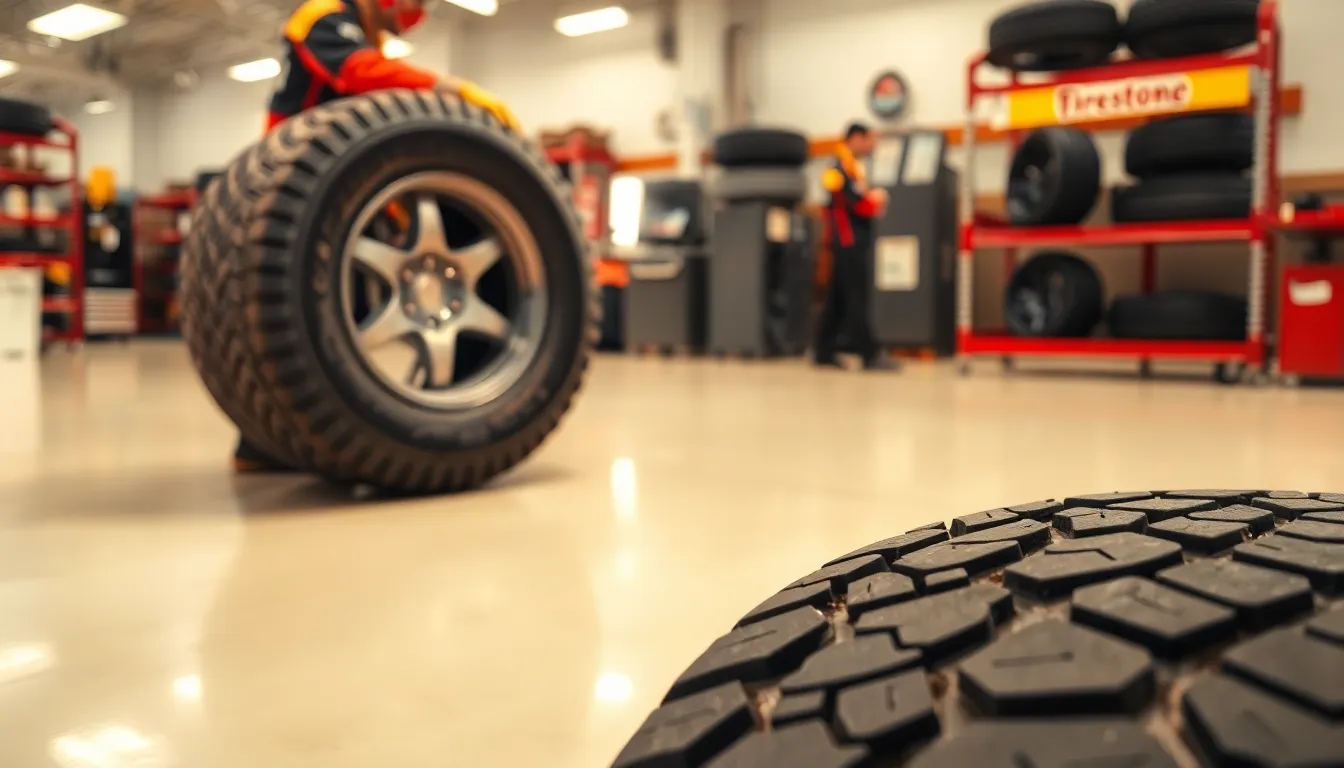
Firestone tires deliver solid value through competitive pricing combined with reliable performance metrics. The brand’s ability to balance cost and quality makes it an attractive option for drivers seeking dependable performance without premium pricing.
Warranty Coverage and Support
Firestone backs its tires with comprehensive protection through multiple warranty programs designed to safeguard consumer investments. The Gold Pledge Limited Warranty covers passenger and light truck tires with a replacement program for defects within the manufacturer’s control.
Basic Limited Warranty provides pro-rated replacement for tires that become unusable within four years from purchase. Manufacturing issues receive coverage through the Workmanship and Materials Warranty spanning 5-6 years after purchase.
Mileage Warranty typically extends 4-6 years from purchase, ensuring exact mileage performance before tread wear reaches replacement levels. These warranty options create a safety net that enhances the overall value proposition for consumers.
Support services complement warranty coverage through Firestone’s extensive network of over 1,700 Complete Auto Care locations across the United States. Professional installation and maintenance services ensure optimal tire performance throughout the warranty period.
Cost-Effectiveness Analysis
Firestone tires consistently price below premium competitors while delivering comparable performance in key areas. The brand’s strategic positioning allows consumers to access quality tire technology without paying luxury brand premiums.
Durability factors significantly impact long-term cost effectiveness, with Firestone tires engineered for extended service life through proper maintenance practices. Even tread wear patterns maximize tire lifespan, reducing the frequency of replacement purchases.
Competitive pricing varies based on exact model selection and tire size requirements, though Firestone maintains affordability across its product lineup. Fleet operators frequently choose Firestone for cost-effective mileage performance that supports budget management goals.
Enhanced cost effectiveness emerges through warranty coverage that protects against premature tire failure and manufacturing defects. Pro-rated replacement programs reduce unexpected replacement costs during the coverage period.
Fuel efficiency contributions from select models like the Champion Fuel Fighter provide additional cost savings through reduced gas consumption over the tire’s service life.
Conclusion
Based on our comprehensive analysis Firestone delivers solid tire performance at competitive prices. Their century-long heritage combined with Bridgestone’s modern engineering creates reliable products that serve diverse driving needs effectively.
We’ve found that Firestone consistently outperforms expectations in the mid-tier tire segment. Their warranty coverage and extensive service network add important value beyond the initial purchase price.
For most drivers seeking dependable performance without premium pricing Firestone represents an excellent choice. Whether you’re driving daily commutes or weekend adventures their tire lineup offers practical answers that balance quality with affordability.
The brand’s commitment to continuous improvement and customer satisfaction makes Firestone a trustworthy option in today’s competitive tire market. Their track record speaks volumes about delivering consistent value to millions of satisfied customers nationwide.
Frequently Asked Questions
Are Firestone tires good quality?
Yes, Firestone tires offer solid quality with an overall Consumer Reports score of 4.0 out of 5.0. They demonstrate reliable performance in braking, handling, and noise control. While they may not match premium brands in extreme weather conditions or tread life, Firestone tires exceed minimum legal requirements and are built with durable materials for consistent performance.
How long do Firestone tires last?
Firestone tires are engineered for durability and even tread wear, maximizing lifespan through proper maintenance. The actual lifespan varies by model and driving conditions, but many users report satisfactory longevity. Models like the Champion Fuel Fighter are specifically recognized for their extended lifespan and fuel efficiency benefits.
Are Firestone tires better than Michelin or Goodyear?
Firestone offers more affordable options compared to premium brands like Michelin and Goodyear while delivering comparable performance in most conditions. Premium brands often excel in extreme weather and tread life, but Firestone provides excellent value for budget-conscious consumers seeking reliable performance without the premium price tag.
What is Firestone’s warranty coverage?
Firestone provides comprehensive warranty coverage including the Gold Pledge Limited Warranty and other programs that protect against manufacturing defects and premature wear. This extensive warranty coverage enhances the overall value proposition and protects consumer investments, backed by over 1,700 Complete Auto Care locations nationwide for service support.
Which Firestone tire series is best for my vehicle?
The Destination series is ideal for SUVs and trucks, offering models like the LE 2 for smooth road performance and AT2 for off-road capability. The Champion series suits everyday passenger car driving with excellent fuel efficiency. The Firehawk series targets performance vehicles, providing superior handling and traction for enthusiastic drivers.
Are Firestone tires good in wet weather?
Yes, Firestone tires feature adaptive rubber compounds and unique tread patterns designed to enhance grip and safety in wet conditions. Models like the Destination LE 2 are specifically praised for excellent rain performance, while the brand’s engineering focuses on maintaining traction across various weather conditions.
How do Firestone tire prices compare to competitors?
Firestone consistently offers more affordable pricing than premium competitors like Michelin, Goodyear, and Continental. This price advantage makes Firestone particularly attractive for budget-conscious consumers and fleet operators who need reliable performance without premium costs, delivering excellent cost-effectiveness and value for money.
Do Firestone tires provide a comfortable ride?
Yes, Firestone tires incorporate shock-absorbing elements and precise tread pattern engineering to reduce road noise and enhance ride comfort. Many users report smooth driving experiences with predictable performance. However, some models may produce slightly more road noise than premium alternatives, varying by specific tire model.

